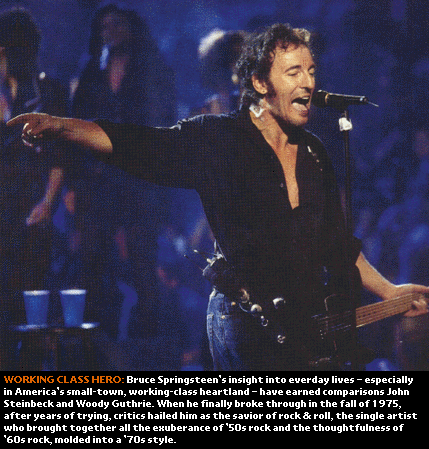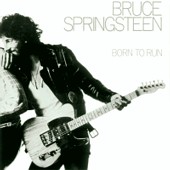|


"Born To Run"
Bruce Springsteen
Columbia 10209
Oct. 1975
Billboard: #23
 
  t was very easy for me to distrust Bruce Springsteen's intentions around the time of "Born to Run." In the mid-'70s, there were just too many bombastic rock bands whose overproduced product came seeping through the compressed signals of FM radio stations. Jefferson Starship, Journey, Foreigner, Styx, and Boston were all touting "big" rock with a sound that was about as huge and impenetrable as a granite wall. Once I heard the glockenspiel on "Born to Run," I assumed Springsteen was as guilty of destroying the straightforward essence of his work as all the others had been, and I consciously started to avoid his music. Granted, this wasn't a particularly easy thing to do if you lived in New York. Springsteen was a Jersey kid, and certain regional radio stations were elevating him to the status of demigod. Every morning, WNEW-FM would play a Springsteen track and refer to it as "the morning Bruce juice." Besides the completely disgusting connotations that this brought to mind, it also struck me as juvenile. So I would change stations as soon as the scheduled moment would roll around. Another problem was the unabashed praise Springsteen was receiving from the music press. With only a few albums to his name, each of which displayed only fraction of his true potential and had less than stellar production values, he was being hyped beyond recognition. The Bob Dylan comparisons were a particularly annoying and transparently manufactured campaign, the relevance of which completely eluded me after his first album. As far as I was concerned, the whole thing added up to little more than macho posturing and blather. Boy, was I wrong. t was very easy for me to distrust Bruce Springsteen's intentions around the time of "Born to Run." In the mid-'70s, there were just too many bombastic rock bands whose overproduced product came seeping through the compressed signals of FM radio stations. Jefferson Starship, Journey, Foreigner, Styx, and Boston were all touting "big" rock with a sound that was about as huge and impenetrable as a granite wall. Once I heard the glockenspiel on "Born to Run," I assumed Springsteen was as guilty of destroying the straightforward essence of his work as all the others had been, and I consciously started to avoid his music. Granted, this wasn't a particularly easy thing to do if you lived in New York. Springsteen was a Jersey kid, and certain regional radio stations were elevating him to the status of demigod. Every morning, WNEW-FM would play a Springsteen track and refer to it as "the morning Bruce juice." Besides the completely disgusting connotations that this brought to mind, it also struck me as juvenile. So I would change stations as soon as the scheduled moment would roll around. Another problem was the unabashed praise Springsteen was receiving from the music press. With only a few albums to his name, each of which displayed only fraction of his true potential and had less than stellar production values, he was being hyped beyond recognition. The Bob Dylan comparisons were a particularly annoying and transparently manufactured campaign, the relevance of which completely eluded me after his first album. As far as I was concerned, the whole thing added up to little more than macho posturing and blather. Boy, was I wrong.
 | "Born To Run," Springsteen's first hit single, first charted on Oct. 11, 1975, and spent five weeks on the US pop chart. Advance sales for "The Boss"'s Born To Run album put it on the chart a week before its Sept. '75 release date, and it hit #3 -- and gold -- within a month, spending a total of over 60 weeks on the Billboard Hot 200. |
|  |
My ignorance caused me to miss the potency of Springsteen's first four albums. While my contemporaries were going to his concerts and seeing some of the most fulfilling and energetic live shows that anyone had ever staged, I continued to dismiss him as an overrated overachiever. Slowly (verrrrrry slowly), I began to come round. I think it was the Bo Diddley slam of "She's the One" that got to me first. ("Bo Diddley," besides being a person, is also a beat.) As time passed, I began to notice that my opinions of Springsteen's songs were changing with startling regularity. "Racing in the Streets" sank in next, then "4th of July, Asbury Park (Sandy)." I even succumbed (finally) to the infectious overdrive of "Rosalita." By the time Springsteen released his fifth album, The River, I was forced to face down whatever prejudices I was harboring. When I heard the painfully rendered (and, more importantly, subtly understated) power of songs like "Wreck on the Highway," "Stolen Car," and "Fade Away," I knew I'd been dead wrong about this guy.
When I began comprehending one slice of Springsteen's nature, his whole body of work came into focus for me. Even his joyful rockers were impressing me, now that I appreciated this complex personality who could imbue innuendo into his compositions with direct and powerful imagery. It might have taken me forever, but it eventually sank in that Springsteen embodied everything that was transformational about the spirit of rock and roll. I was now a receptor for his message: if you believe in something hard enough, it can save you. His dark songs often capture the somber mood of self-reflection and the sobering awareness of life's difficulties, while his rockers practically brim with life-affirming self-confidence and positive energy.
"Born to Run" is the ultimate anthem for the pursuit of a new life. Nearly every line is an overwrought metaphor, but the message is as plain as the guitar slung over Springsteen's shoulder. The character's need to break out of his cloistered world and run headlong into the expanse of the future is as desperate as it is palpable. To the song's narrator, the future, freedom, and "space" are all confused as the same thing, while the present is only a "death trap" that must be escaped at all costs. For a generation of post-adolescent kids who were staring down the future as though it were the barrel of a shotgun, this was a powerfully uplifting message. After all, in one year's time, a generation of kids who missed (or, like I once did, chose to miss) Springsteen's message of deliverance would be pogoing to the Sex Pistols while howling about "no future." A dead-end present allows only two options: blithe resignation and the abandonment of your dreams, or a willful determination to fight your way out of the crowd and find a place, or a person, or a belief that can rejuvenate you, invigorate you, and maybe even save your soul. Springsteen's song kicked down the walls of complacency and reached a veritable army of kids who were inspired enough by his message to find their own reasons to believe. Rock and roll offered Springsteen the power to transform his own life. Rather than abuse the privilege, he in turn dedicated his career to transforming the confusion of his audience into determination and a sense of hope that was uniquely theirs. Springsteen is living proof that the positive energy of rock and roll is not only captivating, but can set you free.
- Thomas Ryan, American Hit Radio, Prima Entertainment, 1996.
 Reader's Comments Reader's Comments
No comments so far, be the first to comment.

|


